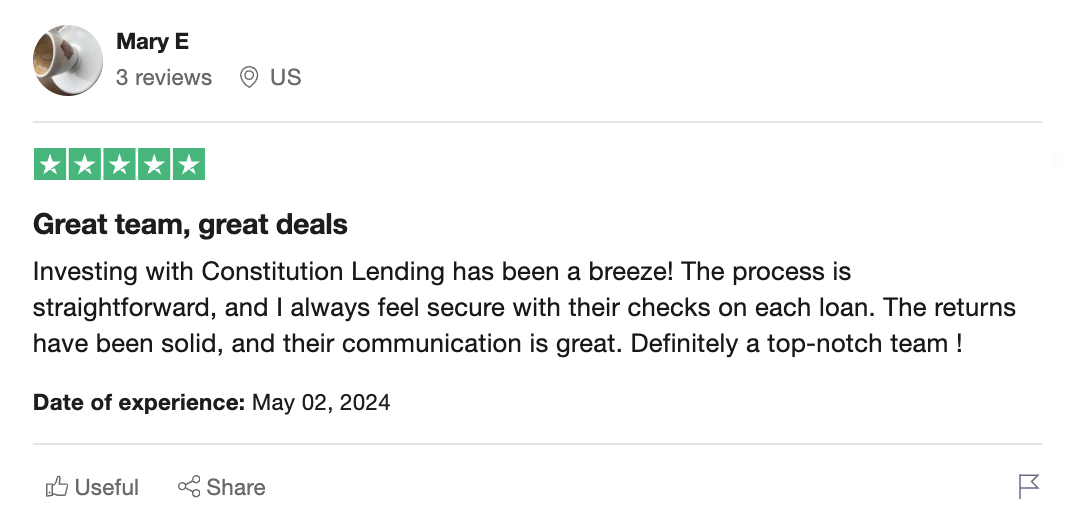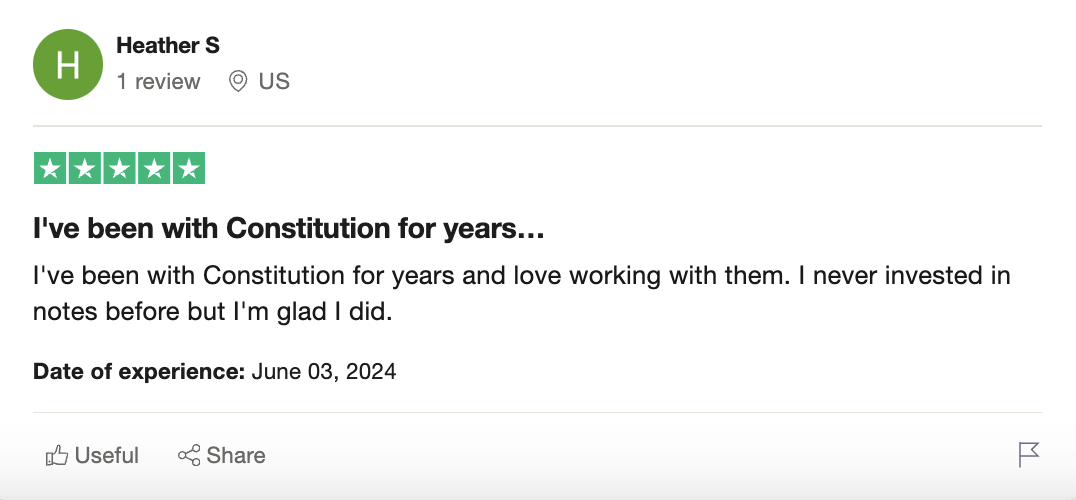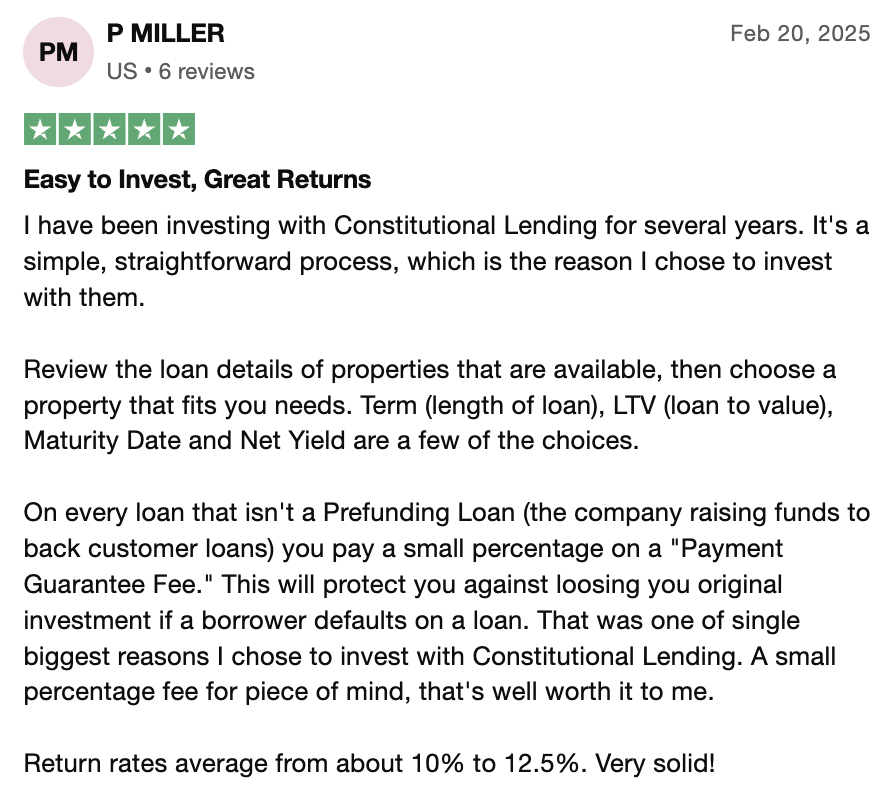Although online marketplaces may seem like a safe and accessible way to purchase commercial notes, we strongly advise avoiding them because they are typically filled with low-quality notes on the brink of default.
Often, the financial interests of most marketplaces go against your goal of buying high-quality notes. Motivated by commissions from sales, they want to facilitate as many sales as possible. In order to do this, they will list any and all notes with no quality checks. Sellers know this, which has turned them into convenient outlets for offloading bad notes to note buyers.
To ensure you’re investing in safe, high-quality notes, invest through a platform where financial interests align with yours.
For example, with Constitution Lending, we’ve originated all the featured loans on our platform with our own capital, and investors can purchase shares in them. This gives them confidence in our note options because our money is invested alongside theirs, and our financial incentives align to ensure the loan continues to perform and earn high yields.
In this article, we cover how you can invest in the commercial loans we originate, the benefits of this over traditional online marketplaces, and what sets our commercial notes apart from others on the market.
Open an investment account and invest in our commercial notes starting with only $1,000. Because of our note quality, none of our investors have ever lost principal.
Constitution Lending: Invest in Our Commercial Notes Starting with $1,000 and Earn 10%–14% Interest

Constitution Lending is a private lender based in Connecticut. We issue fix-and-flip, construction, and bridge loans to experienced real estate borrowers in exchange for interest payments ranging from 10% to 14%.
Investors can purchase shares in these loans through our investment platform, starting with $1,000.
There are three advantages to investing fractionally with Constitution Lending, rather than buying commercial notes from online marketplaces:
- We invest alongside you: As we mentioned above, because you invest in loans we’ve originated, our money is alongside yours. Our interests are aligned as we both want the borrower to keep paying. Online marketplaces don’t have this skin in the game.
- You don’t need much capital: The cost of real estate in the U.S means that if you want to purchase high-quality commercial notes, you’ll need at least $300,000. But when you invest fractionally with Constitution Lending, you can start with just $1,000.
- It’s more passive: When you buy commercial notes, you’ll need to underwrite the borrower’s financials, service the loan, and familiarize yourself with foreclosure laws and processes in case the borrower defaults. When you invest fractionally, we do all of that. You simply receive your principal and interest payments.
Below, we dive into what sets our commercial notes apart from those of most lenders.
Earn 10% to 14% Annualized Returns
Our short-term commercial loans carry interest rates ranging from 10% to 14%. As a loan investor, you receive borrower interest payments every month until the end of the term. This allows you to earn higher yields than most conventional investments, such as index funds, government bonds, and long-term rentals.
Read more: Investing in Performing Notes: What They Are, Benefits & How to Start
Our Notes are Secured by Real Estate, Offering Strong Principal Protection
All our commercial loans are secured by real estate worth more than the total owed amount. So, if we’re issuing a loan to purchase a property with a market value of $1 million, the most we’ll lend is $750,000; the borrower provides the rest.
This 25% equity cushion makes it significantly easier to recover the owed amount if the borrower defaults. It essentially means the borrower can default, the property’s value can fall to $750,000, and we can still recover the owed amount by liquidating and selling the property. The borrower’s equity is the first to absorb any decline in the property’s value. They have to lose their entire equity investment before you lose a cent.
Very few asset classes provide this degree of principal protection.
Read more: How to Invest in First Trust Deeds: Benefits & Risks Explained
Our Borrower Default Rate is Under 2%
Our default rate, which is a metric that measures the percentage of borrowers who default, is under 2%. This means that for every 100 loans we originate, less than 2 default. The nationwide average in the U.S is double that, at 4%.
This low default rate is thanks to the quality of borrowers we lend to. Borrowers in our network have strong credit scores and decades of real estate investing experience, so they understand real estate investing inside and out. This significantly reduces the likelihood of default.
We Offer a Payment Guarantee On All Our Commercial Notes
Although defaults are rare, we still want to give our investors peace of mind that they are still protected if the borrower stops making payments.
So, we offer a payment guarantee on all our loans, which means that if borrowers stop making payments, we will pay you up to 6 months of cash flow using our own funds. These 6 months give us enough time to either negotiate with the borrower and get them paying again, or go through the foreclosure process, liquidate the collateral, and return your principal investment.
We are currently the only private lender that we know of offering a payment guarantee on all commercial note options.
Read more: How to Invest in Hard Money Loans: A Comprehensive Guide
You Receive Your Principal Investment in 6 to 12 Months
The duration of our commercial loans are between 6 and 12 months. At this time, the borrower sells the underlying real estate and uses the sale proceeds to repay the loan.
This structure allows you to recover your invested capital within a short period; you have more liquidity and aren’t locked in for years.
How to Start Note Investing with Constitution Lending
Investing in our commercial notes takes less than five minutes. All you need to do is:
- Sign up for an investment account by entering your full name and email address.
- You’ll land on the available investments dashboard, where you can view all the note options that you can invest in. You'll be able to see the interest rate, loan amount, and risk rating.

- Click on a note to get a better understanding of its structure and do your due diligence. You can view the LTV ratio, after-repair LTV, interest rate, borrower creditworthiness, payment history, outstanding amount, appraised real estate value, and exit strategy.

- Once you’ve decided on a note to invest in, click on it, select the “Fund This Loan” icon in the bottom right-hand corner, connect a retirement or bank account, and enter the amount you’d like to invest, starting from $1,000.
- You’ll receive borrower interest payments on the first of each month, and your principal investment at the end of the term.
Here’s what borrowers say about our commercial note options:



Alternative Ways to Invest in Commercial Real Estate Notes
Buy Business Notes From a Bank or Credit Union
Financial institutions, such as banks and credit unions, will sometimes pool performing loans that they’ve originated and sell them to institutional investors. This is known as a standard pool offering or SPO.
These commercial notes are typically higher-quality than those of online marketplaces because they’re backed by the bank’s stronger underwriting standards. However, purchasing commercial notes from banks is extremely expensive and isn’t an option for most individual investors. Most SPOs require at least $2 million and sometimes up to $5 million.
In addition to the steep capital requirements, mortgage note buyers would also need established relationships with banks to participate in SPOs. These investment opportunities aren’t usually open to the general public.
Lend Capital Directly to Borrowers
Some investors opt to lend money directly to borrowers and earn interest on their loans.
However, direct lending requires expertise in loan sourcing, origination, underwriting, servicing, and foreclosure. Most individual investors with full-time jobs or businesses who simply want passive income and strong returns don’t have time to manage all of this themselves.
It's far easier and safer to partner with a reputable private lender experienced in loan sourcing, underwriting, servicing, and foreclosures, and invest in their performing loans.
Frequently Asked Questions
How do I evaluate commercial notes before purchasing them?
Consider a note’s LTV or (Loan-to-value) ratio. LTV compares the total loan amount to the value of the collateral, and it’s the most important metric to evaluate because it shows by how much you’re protected.
For example, if the owed amount is $700,000 and the commercial property is worth $1 million, you’re protected by a $300,000 borrower equity. It means the property’s value can fall to $700,000, the borrower can default, and you can sell the property for $700,000 and recover what you’re owed.
Where can I find mortgage notes for sale?
There are three main places where investors typically purchase mortgage notes:
- Private lenders: Investing through a private lender is an excellent option for those seeking an affordable way to begin investing in mortgage notes. You can buy shares in the loans they’ve already originated, so you don’t need capital for the entire loan.
- Online marketplaces: While online marketplaces may seem like a good way to purchase notes, we found that they mainly consist of bad notes that note holders want to offload. That’s because these marketplaces earn sales commissions, so they want to list as many notes as possible, with few quality checks.
- Large banks: Banks and other financial institutions sell mortgage notes that they have originated, in what’s known as a standard pool offering (SPO). The problem with this is that they aren’t open to the public and require a minimum investment of at least $2 million.
Do banks sell promissory notes?
Banks typically offer promissory notes to investors as part of standard pool offerings (SPOs), where they pool several loans they have originated and sell them to institutional investors. Each pool typically has its own risk rating, and pools with more risk come with higher yields. However, the problem with SPOs is that they aren’t practical for individual investors, as they require an investment of upwards of $2 million.
What are the anticipated returns from a note purchase?
The returns you can expect from mortgage notes will depend on their interest rate. For most long-term (10–30 years) mortgage notes, you can earn between 5% and 7%. However, when you invest in Constitution Lending’s hard money notes, you can earn between 10% and 14% annually because you’re investing in short-term loans such as fix-and-flip and construction loans.
What is a note sale in real estate?
Real estate notes are essentially a document used to purchase a property that shows the owner of the loan. The owner of the note is the person who made the loan and receives principal and interest payments from the borrower. A note sale occurs when a debtor sells the note to another party, who then is the new recipient of the borrower’s principal and interest payments.
Is flipping mortgage notes worth it?
Flipping mortgage notes can be worth it, but only if you already have the experience and expertise in debt resolution. Flipping mortgage notes will require you to purchase non-performing notes, and then find a way to get the borrower to continue paying. This could be through a loan restructuring or foreclosure. As a result, individual investors who are interested in flipping non-performing mortgage notes will usually invest through a fund.
Earn 10% to 14% Interest Investing in Commercial Notes with Constitution Lending
You can learn more about our commercial note options by opening a free investment account here.







